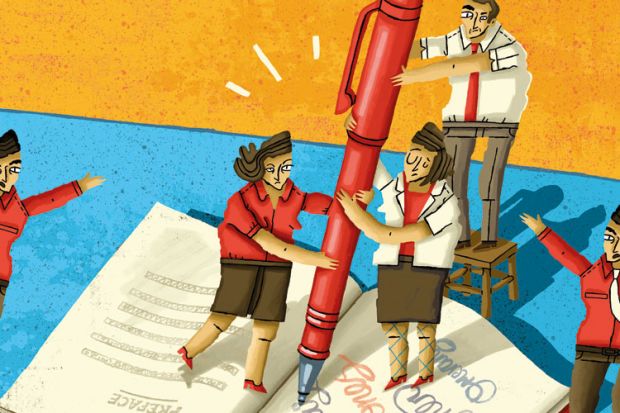When I interviewed academics about ethical issues recently, a recurring gripe was that they had been under-credited when publishing with others. Most experienced researchers seemed to have a similar war story.
This was once a problem largely confined to the hard sciences, where it is usual to see long lists of contributors, but it has recently become much more common among social scientists. In education, for example, multiple authorship is now the norm. Educational Studies, a leading journal in the field, had an average of 1.13 authors per paper in 1975; by 2014, it was 2.76.
The order in which names appear on an academic publication matters a lot. First authorship is a prestige indicator. Citations, invitations to speak and requests to review papers and grant proposals are all likely to go to the first author, and the number of first authorships is a crucial factor in appointment, promotion and tenure decisions. It may influence judgements about whether to include an academic in an audit return, such as the research excellence framework. Moreover, in various parts of the world, including China and Japan, PhD students need to publish as first authors before they are allowed to graduate.
I recently asked education academics in Hong Kong to offer solutions to “real-to-life” case studies about authorship order. I discovered widespread support for a kind of gift economy.
For example, the vast majority of respondents thought that the person who wins the research grant should always be an author, and normally the first author, regardless of any further contribution to the project. This power ordering, as I call it, tends to favour research supervisors, senior academics and principal investigators. The authorship claims of the powerless, such as postdoctoral fellows and research assistants, are often dismissed on the basis that they are merely “hired hands”.
PhD students are also very vulnerable. More than three-quarters of my respondents thought that research supervisors should receive a co-author credit even when they have played no role in designing a study, gathering data, analysis or writing up. It is even common for PhD students to include the name of their supervisor on their academic publications years after they have graduated, often out of a sense of indebtedness. I have personally come across young academics in Russia, as well as in several parts of East Asia, who have ceded unwarranted credit in this way.
My research also highlighted a second form of gifting practice. This occurs when authorship order is manipulated to benefit the person who needs a first authorship the most. Good intentions can lie behind gifting a first authorship to an emerging scholar or helping to bolster a colleague’s CV in preparation for a promotion or tenure application. But it is another deliberate misrepresentation of the truth about levels of intellectual contribution.
These findings were disappointing but hardly surprising. In East Asia, respect for authority and the social politics of gift and favour reinforce practices that prioritise the development of relationship-building over recognition of merit. When I presented my findings in Hong Kong, one long-serving Western professor asserted that “relationships are more important than the truth”.
It is worrying that senior academics see little wrong with practices that are deceptive and based on an abuse of power and position. Determining authorship order is often far from simple, but considerations of power and position should play no role in it.
Academics know full well that faking or manipulating data is wrong, but there appears to be a far less scrupulous attitude towards misrepresenting contributions to a published paper. While my research has focused on Hong Kong, there is plenty of evidence that this attitude exists internationally. Studies of British and French medical researchers, for example, show that international guidelines on authorship are often ignored.
The Vancouver Protocol of 1978 says that authorship should be based on substantial contributions to designing a study or carrying out data analysis; writing the article for publication or revising it for intellectual content; and approving the final version. To be a legitimate author, someone is supposed to be involved in all three stages, not just one. The protocol is used by medical science journals and is increasingly adopted in university policy documents, and has even been adopted system-wide in Australia. Yet it is not vigorously enforced. Universities have become very vigilant about ethical approval policies in recent years, but have rarely paid much attention to muddier issues like authorship order.
The rhetoric in modern higher education is all about the virtues of partnership and cooperation. But authorship order can represent the darker side of collaboration. Universities need to do more both to educate academics and to protect junior staff and researchers in vulnerable positions.
Bruce Macfarlane is professor of higher education and co-director of the Centre for Higher Education at Southampton at the University of Southampton. He was previously a professor of higher education at the University of Hong Kong. He is presenting his research on the ethics of multiple authorship at the Society for Research into Higher Education’s annual conference, which runs from 9 to 11 December in Newport, South Wales. A paper based on his research is available here.
POSTSCRIPT:
Print headline: Time for a credit check
Register to continue
Why register?
- Registration is free and only takes a moment
- Once registered, you can read 3 articles a month
- Sign up for our newsletter
Subscribe
Or subscribe for unlimited access to:
- Unlimited access to news, views, insights & reviews
- Digital editions
- Digital access to THE’s university and college rankings analysis
Already registered or a current subscriber?




